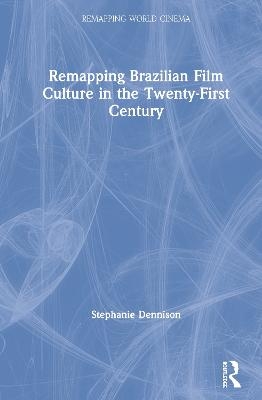
Remapping Brazilian Film Culture in the Twenty-First Century
Routledge (Verlag)
978-1-138-11983-3 (ISBN)
Remapping Brazilian Film Culture makes a significant contribution not only to debates about Brazilian national cinema, but more generally about the development of world cinema in the twenty-first century.
This book charts the key features of Brazilian film culture of the first two decades of the twenty-first century, including: the latest cultural debates within Brazil on film funding and distribution practices; the impact of diversity politics on the Brazilian film industry; the reception and circulation of Brazilian films on the international film festival circuit; and the impact on cultural production of the sharp change in political direction at national level experienced post-2016. The principle of "remapping" here is based on a need to move on from potentially limiting concepts such as "the national", which can serve to unduly ghettoise a cinema, film industry and audience. The book argues that Brazilian film culture should be read as being part of a globally articulated film culture whose internal workings are necessarily distinctive and thus deserving of world cinema scholars’ attention.
A blend of industry studies, audience reception and cultural studies, Remapping Brazilian Film Culture is a dynamic volume for students and researchers in film studies, particularly Brazilian, Latin American and world cinema.
*Honorary Mention - Best Book in Humanities for the LASA Brazil Prize 2021*
Stephanie Dennison is Professor of Brazilian Studies and directs the Centre for World Cinemas at the University of Leeds. She has published widely on both world cinema and Brazilian film: she co-authored with Lisa Shaw Popular Cinema in Brazil (2004) and Brazilian National Cinema (2007).
Introduction
Part I
Chapter One: Making Films in Twenty-first-century Brazil
Chapter Two: Engaging With Audiences at Home and Abroad
Chapter Three: Women and Film Culture in Brazil
Chapter Four: Brazil’s LGBTQ Communities and Film Culture
Chapter Five: Afro-Brazilian Filmmaking in the Twenty-first Century
Chapter Six: Screening the Indigenous Experience in Brazil
Part II
Chapter Seven: Cinema and Public Security: The Elite Squad
Phenomenon (2007-2010)
Chapter Eight: Lúcia Murat’s Olhar Estrangeiro (2005) and the
representation of Brazil on Foreign Screens
Chapter Nine: Hope Springs From Rubbish: Trash (2014) and the
Garbage Aesthetic
Chapter Ten: A Cordial View from Brazil’s North East: Kleber Mendonça Filho’s Aquarius (2016)
Epilogue
| Erscheinungsdatum | 19.02.2018 |
|---|---|
| Reihe/Serie | Remapping World Cinema |
| Zusatzinfo | 35 Halftones, black and white; 35 Illustrations, black and white |
| Verlagsort | London |
| Sprache | englisch |
| Maße | 156 x 234 mm |
| Gewicht | 453 g |
| Themenwelt | Kunst / Musik / Theater ► Film / TV |
| Geisteswissenschaften ► Geschichte | |
| Sozialwissenschaften ► Ethnologie | |
| Sozialwissenschaften ► Kommunikation / Medien ► Medienwissenschaft | |
| Sozialwissenschaften ► Soziologie ► Spezielle Soziologien | |
| ISBN-10 | 1-138-11983-0 / 1138119830 |
| ISBN-13 | 978-1-138-11983-3 / 9781138119833 |
| Zustand | Neuware |
| Haben Sie eine Frage zum Produkt? |
aus dem Bereich


